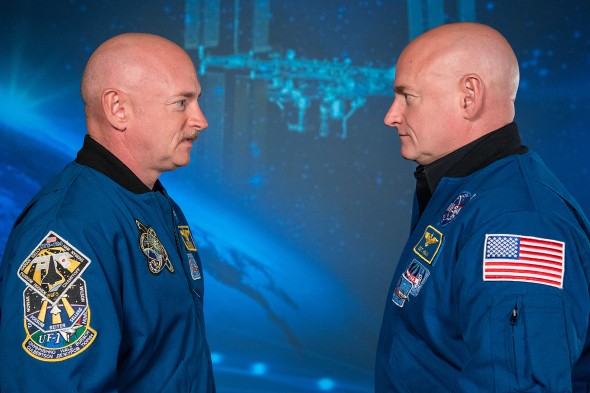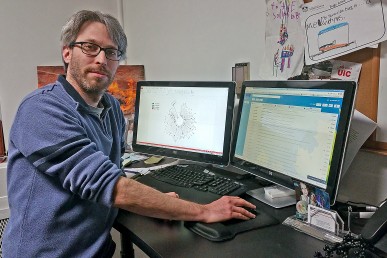UIC researchers study gut feelings of identical twin astronauts

Scott Kelly (right) was launched into space in March while his twin, Mark Kelly, a retired astronaut, remains on Earth. — Photo: Robert Markowitz/NASA
UIC researchers are part of a NASA study on identical twin astronauts – one who is spending a year at the International Space Station and one who remains on Earth.
Ten research teams are studying the impact of long-term stay space by comparing physiological changes in Scott Kelly, who was launched into space in March, and his twin, Mark Kelly, a retired astronaut.
UIC is part of a study with Northwestern University and Rush University Medical Center on how space impacts the microbial community of the gut, said Stefan Green, director of the DNA Services Facility in the Research Resources Center.

Researcher Stefan Green leads UIC’s part of the study examining how space impacts the microbial community of the gut.
The research team is collecting fecal samples from both twins before, during and after spaceflight to analyze gastrointestinal tract changes.
“We are looking within the individual to see how the gut microbial community is changing over time,” Green said. “In space, there’s a very limited diet, so a disrupted gastrointestinal community in one individual could potentially be propagated to the rest of the people living in the space station.”
Mark, the twin who remains on Earth, is not eating an astronaut’s diet like his brother, Green said, but scientists can compare their samples for changes over time.
“We can see how the Earth-bound gut changes over the course of a year, and we may hope that in space we see a more dramatic trend,” Green said. “It’s hard when you have such a small data set to be truly rigorous scientifically but I think some interesting things can come out of it.”
Samples from Scott Kelly are being transported back to Earth periodically, Green said, but scientists will wait until he returns in March to begin the analysis. They hope to have preliminary findings next fall.
Changes in the gastrointestinal can have a negative impact on health, Green said. Changes in gut bacteria in people who have Parkinson’s disease, for example, can weaken their immune system.
“We’re at the tip of really understanding how the microbial community affects us both negatively and positively and learning how we might be able to control the microbial community, leading to health benefits,” he said.
Green is working on another NASA-funded study to send mice to the International Space Station for another look at the impact of space on the gut microbial community.
“The study is in flight-definition stage right now so it will probably be a couple of years,” he said.
“How many genetically identical individuals are you likely to get into space? You’ll never be able to do a replicated study with humans, so you need animal models.”
